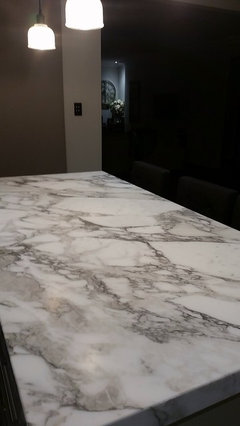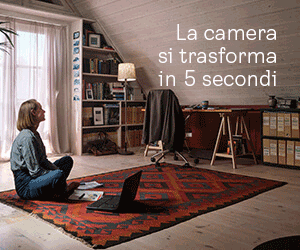Ever heard of "oiling" marble countertops?
I spoke with the once-owner of a stone yard, a very charming Italian gentleman (aren't they all?) who gave me the following advice:
After my honed marble tops are sealed and installed, I should spray PAM all over them, let them sit overnight and wipe them off with lots of paper towels. He maintained that this would keep new oils from discoloring the marble in spots, since the marble would already be saturated.
Has anybody ever heard of this method or better yet, tried it?
Commenti (14)
practigal
7 anni faIf you pour oil onto a marble counter some of that oil is going to soak into the counter because marble is porous. It will darken the marble, and probably not darken it very evenly either because the stone itself is not consistent, are you going to be OK with that darkness? The oil that doesn't soak into the counter you are going to wipe up. To the extent you miss wiping it up, it's going to be a dirt magnet. Yuk. Didn't you buy marble for it light translucent qualities? Did your fabricator give you a guarantee? If so, do exactly what they say because they're the people who are going to help you if there is a problem. I recommend to you that you get a scrap and try it on a scrap before you do something to your countertops.
eam44
7 anni faUltima modifica: 7 anni faIn the old country they do (did) a lot of things differently: they don't hone their slabs, they etch them by inviting their friends over to crush tomatoes on them, they don't seal them, they oil them - with olive oil.
Pam is made of: canola oil, palm oil, coconut oil, soy lecithins, dimethyl silicone, rosemary extract, and propellant. You couldn't pay me to spray Pam on a muffin tin, let alone a brand new honed, sealed marble counter. My advice? Nod, smile, say thank you, then "fuhgeddaboudit." Old and new methods don't always play well together.
_sophiewheeler
7 anni faUltima modifica: 7 anni faVegetable oils will turn rancid, which is bacteria breaking down the oils. If you've ever had gross French fries from old oil, you will know rancid. Only mineral oil will not turn rancid. I really don't think you want to turn your porous marble stone into a giant bacterial colony that needs Febreeze just to be around.
murchkid
Autore originale7 anni faOK. Just checking. I figured it was a bit weird, but then, when I roll out crusts and doughs, I suppose the various "fats" will make their way into the stone, like it or not. I'm not worried about babying the marble (too much, either). I actually appreciate the look of a well-loved stone. Thanks for the input, gang!
agregory27
5 anni faI was told by the marble salesman (Italian with a very thick accent) that he seasons his entire bench with vegetable oil. He makes breads and pastries every Sunday, as do his parents in Italy on a 100year old bench. This was after I told him that I didn't want to seal my bench since I too make pastries regularly. Clearly it is a non- European hangup that our marble must remain pristine and unmarked. I have now had my beautiful marble bench (kitchen) for over a year. Yes there are marks, but I don't care - it's like a person's face that ages gracefully with time. Definitely prefer this to the man-made stuff! BTW he also said that they use extra virgin olive oil throughout Italy in the churches to keep a soft sheen on all the marble. I use melted coconut oil and then polish off with a microfibre cloth every 2 - 3 weeks. Of course I clean it daily with just water and a cloth. Love it.

Sasha Martin
4 anni faAny more information on oiling marble? Does it help prevent etching as well? Very curious to find a natural way to keep Carrara looking great without constant spray etc. I had a feeling the old Italians knew how to care for it...
Wayne Walpole
3 anni faBeen using olive oil for years. You don't wipe it down and leave it wet. You wipe it down with the oil then continue wiping with a dry clothe till it feels dry.
I use my granite countertop to knead bread and pizza dough and don't want acrylic, silicone, wax and penetrating oil on it. Just says yuk to me.
I do have to say I cook daily and clean the countertop daily.For those wanting a stone show piece that they never prepare food on, then yes, you will want to use the acrylic, silicone, wax, and penetrating oil store bought mixture.
Once you clean with any cleaning agent you have to reapply your mixture.

Ricarica la pagina per non vedere più questo specifico annuncio
mama goose_gw zn6OH